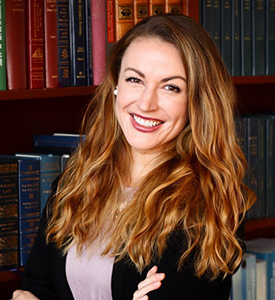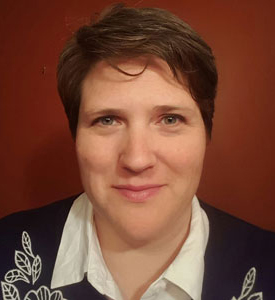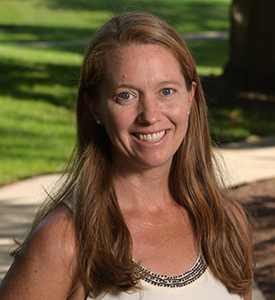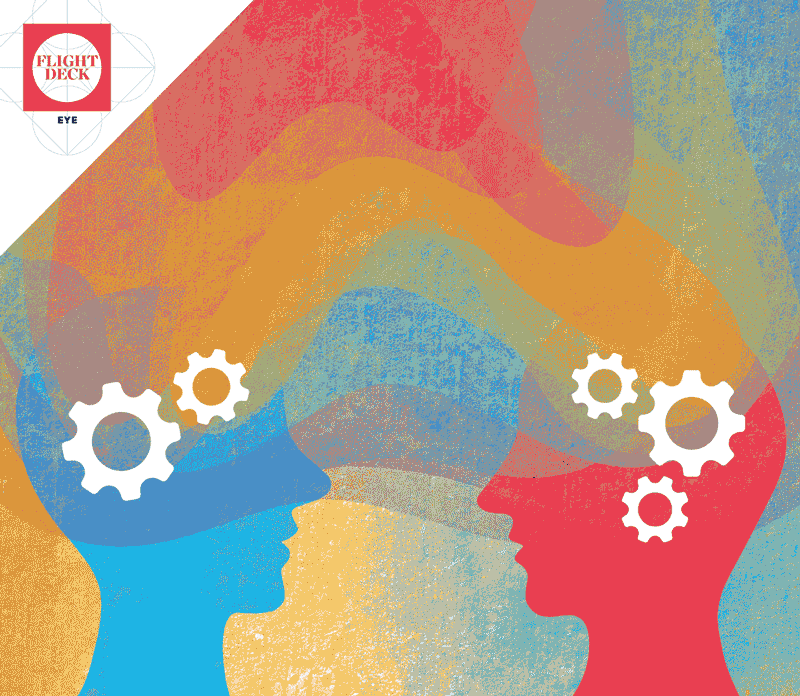An empathetic eye
We asked University of Dayton professors how they think empathy reveals — and challenges — our humanity.
 Jay J. Janney
Jay J. Janney
Director, Center for the Integration of Faith and Work
We believe empathy is a universal good — so much so we call people who lack empathy for others sociopaths, suggesting it’s a necessary human condition. But empathy is like both duct tape and “The Force,” because it too has a light side and a dark side (and helps hold the universe together).
What can be wrong with empathy? Nothing. If you see someone in need and help them, that’s fine. Too often, however, we have to choose who gets our support and who does not. When that happens, we generally exhibit more empathy for those we can identify with relative to those more different from us. We’re more generous donating money for local disasters than for distant ones. We favor those more like us; our neighbors, our colleagues. Being a cute baby or puppy doesn’t hurt either.
My son was 19 months old when I was widowed. I remarried three years later. Before remarrying I did volunteer work and met a little orphan from Romania who stole my heart. I felt led to adopt internationally, and so did my new bride. We applied to adopt from Romania, but three years later the program closed. Where to go next?
Our adoption agency had programs in Guatemala and China. They then introduced a new program in Ukraine (next door to Romania). We were torn. We felt a deep connection to Romania, so was it wrong to adopt a child from elsewhere? Were we discriminatory? Our counselor smiled, telling us each child had an equal right to be adopted. God called us to adopt one — he’d be pleased we were faithful. It was OK to have empathy for one.
So, we went to Ukraine, expecting to adopt a 4- to 6-year-old boy. We were instead offered a 15-month-old girl. When I first held my daughter, I realized she filled a hole in my heart from my wife’s death. She was part of God’s plan. I learned God has sufficient empathy for us all. He only asks of us to be faithful.
 Katie Wright
Katie Wright
Visiting assistant professor, lawyering skills
I recently had a disagreement with someone and came away feeling affected by what I perceived to be an aggressive and rude tone. After a while, a realization sank in — what I had interpreted as rudeness in their voice was really fear. As I thought back to our conversation and the position this person was in, it all began to add up; the conflict, the tone of voice and even the words that were said made sense when said by a person who is experiencing fear over a situation. Once this realization hit, my mind stopped its preoccupation and immediately was opened to start looking for creative solutions and possibilities.
Former President Barack Obama called empathy a superpower, and he was right. Without empathy, we are locked within our own limited perspective, where options are limited. Without empathy we tend to see one-dimensionally and put our “blinders” on. Empathy allows us to embrace the complexity of full human existence, and by doing that, it opens our minds to creativity.
Perhaps nowhere is this more important than in our criminal justice system, where fear and trauma run high. Rejecting the temptation to remove the humanness of the situation, empathy acknowledges the context and complexity of life. It recognizes the humanity in each of us. And it gives us a superpower — the ability to transcend our own experience and think with deep creativity about the problems we can all have a part in solving.
 Meredith L.T. Montgomery
Meredith L.T. Montgomery
Assistant professor, counselor education
Empathy, like love, is most powerful as an action. Having empathy for another person — holding in yourself the ability to hear and understand the emotional experience of another — can lead to increased patience, greater understanding and even ethical decision making. Empathic engagement is inviting someone to share what they think and feel, checking to be sure you understand them accurately, and validating their experience even when it contradicts your own. Empathy invariably leads to deeper social connections, fewer conflicts and a richer experience of life. Just as love begets love, empathy breeds empathy. When we receive genuine empathy from another person, it calls to something deep within us that longs to matter and connect … and we offer that connection in return.
The absence of empathy is the absence of relationship, and that is how isolation, pain and even hatred are born. Empathy is such a natural exchange between human beings that the absence of empathy suggests withholding — withholding space where a person can freely express themselves; rejecting another person’s very essence by withholding your attention and understanding; and destroying opportunities for genuine connection by withholding yourself. When we withhold empathy, our hearts are hardened. Connecting becomes laborious and tiresome. We are fooled into thinking that empathy requires great effort and that the effort is not worth the return. Meanwhile, we drift away from the things that give our lives meaning and find ourselves alone, often angry and unsure why we don’t recognize the world anymore.
If you are struggling to feel empathy, begin with giving. Give your attention to another. Listen with genuine curiosity, looking for connection. Because empathy only matters if we as human beings matter — and if we do, empathy is one of the most important gifts we can give one another.
 Elizabeth Rhoads
Elizabeth Rhoads
Director, premedical programs
A student sits in my office and admits that he has struggled academically since beginning college. He says, “In high school, I used to be a good student.” My heart aches — he is still the same student, I think to myself. I sense that his reality is much different from mine; our circumstances growing up were not the same. Without empathy, I might ignore barriers to his success, brush aside his claim that he is really trying in his classes, suggest that he change his major and set his eyes on a different career field.
I have been privileged in my life; I’m still trying to understand all the various ways. What I do know is that others have experiences and circumstances that are different from mine. Just coming to terms with that is an important step. The next step is to listen, observe and think critically about systems that are set up to support those who are already ahead.
I ask the student in my office to tell me about his high school and his family. I ask him about his goals. Our conversation is real; I acknowledge the challenge he is facing academically and on the broader path to his intended profession. Yet, I encourage him to persist — he can do this. With empathy, I can try to understand him and how to support his path through UD and beyond.
Empathy is central to community, where diversity is valued and dialogue provides space for listening and sharing. In my role at UD, I see empathy as an asset in supporting our students.
